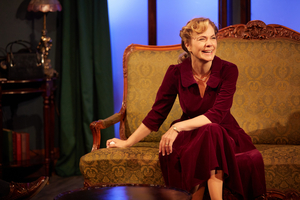Review: BLACK CHIFFON, Park Theatre

![]() Within the first 20 minutes of Lesley Storm's Black Chiffon, Alicia asks "Is there enough gin?". Finally, I thought, a character I could get behind. But as Alicia's Freudian feelings for her son were diagnosed, I found that my initial assessments weren't quite apt. A smile broke on my face, offering a personal moment of levity during an otherwise middling play.
Within the first 20 minutes of Lesley Storm's Black Chiffon, Alicia asks "Is there enough gin?". Finally, I thought, a character I could get behind. But as Alicia's Freudian feelings for her son were diagnosed, I found that my initial assessments weren't quite apt. A smile broke on my face, offering a personal moment of levity during an otherwise middling play.
Roy (Jack Studden) is about to marry Louise (Jemima Watling), and together they are perfectly sweet and happy. Amidst their wedding planning, Alicia (Abigail Cruttenden), Roy's mother, goes out to buy some groceries for that evening's dinner, where she will meet Louise's parents.
But when Alicia comes back three hours later than planned after she was arrested for trying to steal a black chiffon nightdress, her family hire Dr. Hawkins (Nicholas Murchie) to diagnose her recent inconsistent and unexplained behaviour. Set in 1949, this is also a time when respectability and social conformity dictated one's personal life: Alicia's biggest fear is knowing that the tabloids will report her judicial hearing.
Though the play was also written and first performed in 1949, the plot's focus on Alicia's fragile mental condition is both intriguing and frustrating. It truthfully depicts a woman trying to hold together an argumentative family: her husband Robert (Ian Kelly) has always been jealous of the attention she has given to Roy, leading to the two men having a fractured relationship.
With our increasing awareness of mental health, it is interesting to see the play's focus on Alicia's instability. The play's language when talking about psychological illness however feels archaic: Dr. Hawkins is a "mind specialist", whilst Alicia is said to be going through "emotional disturbances".
The programme states that the play's "core dilemma, universality and psychological accuracy seem as relevant now as ever". This is unfortunately not so. Of course, Oedipus Rex shows that Freudian relationships have occupied drama since its conception. Yet the problem with anything Freudian now is that it seems, frankly, dated. In choosing the mother-son relationship as the root of the play, and giving such weight to psychoanalysis through lengthly conversations with Hawkins, the writing feels odd and outlandish. Cruttenden succeeds in giving her character depth and nuance, but she is restricted by the writing's period setting and tone.
Clive Brill's production also moves slowly at points, especially when transitioning between scenes. Beth Colley's set is very green and feels historically accurate, but it doesn't excite the senses. Though, perhaps, that's the point: the play's undercurrent theme of wartime rationing emphasises that, despite the posh façade, things at home were always a struggle for London families.
The play exhibits the usual comedy that comes with taking a piece from its day and staging it now: there was an audible gasp from an audience member when Robert asks, "That's your job, surely?" of his pregnant daughter Thea (Eva Feiler) when she states she hasn't spent all day in the kitchen. The cast put in respectable performances, though Feiler especially offers some needed resilience and humour.
Black Chiffon is undeniably of its time, and it is charming that Jemima Watling is in the role her grandmother, Patricia Watling, played 50 years ago on Broadway. Though understandably simple and predictable, the play's exploration of a mother's love for her son serves as an arch reminder of how far we've come in diagnosing mental illness and representing it sensitively on stage.
Black Chiffon is at the Park Theatre until 12 October
Photograph credit: Mark Douet.
Videos
